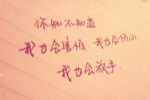
成功大学生英语作文【一】
Opening the biography of the famous, in the first introduction, there is a saying: "the air around us is heavy. The old man's Europa is unconscious in a climate of turbidity and corruption, and the vulgar materialism represses ideas, hindering the actions of F and individuals. Society dies in a perverse, self-serving selfishness, and mankind breathes and breathes. Open the window! Let the free air come back! Breath the breath of heroes."
Obviously, romain rolland would calibrate the time warp with heroism. For romain rolland, the true hero, the true greatness is pain and solitude, the struggle of the self with the invisible. In the same quote he also said, "I am not a hero who is a man of thought or power, but a man of great heart." He is a soul, captured the hero is pain to overcome hardships as a shiny scale to measure the hero, and his celebrity biography is revealed three suffering hero's mind in human history biography. They were the great German musicians of the 9th century, Beethoven, the famous Italian sculptor Michelangelo and the Russian literary giant Leo Tolstoy.
He wrote at the end of the Beethoven revolution: "an unhappy man, poor, crippled, lonely, a man of pain, the world does not give him pleasure, but he creates joy to give to the world; He USES his suffering as a joy, as he tells it with his words, the motto of all the brave souls: "joy in pain." "Indeed," for joy with pain "romain rolland tracking of Beethoven's life view of fate, the words make up the" Beethoven turn "internal tension and fascinating ideological appeal.
What supports Beethoven is the quality that does not bow to the imperial power, is not the determination that is bought by money, it is the courage to strangle destiny's throat! It is with these extraordinary mental powers that Beethoven has reached the most sober grasp of life, over the myriad of life's perilous peaks.
This is the eternal spirit that Roman Roland left us in the biography of the famous!
成功大学生英语作文【二】
"Celebrity biography" perfectly confirms the old adage of Chinese people: the people of ancient and modern times are not only talented but also resilient. Romain rolland holds the three artists in their respective fields together to restore the high morality of 20th century literature and restore its colorful character. Beethoven from flash light to enjoy the reputation of the peak to the bottom of your life, poor tragic from childhood to old age in the pursuit of happiness the twists and turns of life, just as the Roman. Roland described as "his whole life was like a thunderstorm day". From it, I realized that Beethoven has always been in the struggle against the fate, and ideological struggle, even though he gives a person a sense of pride, but his heart a fragile, a strong, are people who do not know him unable to dig. The passion for creating the perfect song, the dedication to seeking joy, and the perfect encounter, made his life become a force of nature. A primitive force between the rest of the ingredients of that kind of engagement with nature, the Homer epic spectacle ", he in his own misery in casting, joy "with joy" pain is sufficient to enrich his life. Michelangelo was not "he is powerful, he was born to fight, to conquer, and he conquered -- he did not win." That's not what he's looking for." He was a spiritual aristocrat, a genius, but he was troubled by genius, and his spirit and soul were powerless. This crazy spark exists in an overly effeminate body and mind that cannot control its terrible life. From this I can see that his life is a sacred pain
As long as we understand the "celebrity biography to our high sublimation, and make the hero of the blood is in front of us at the moment, the hero of the red flag flutters on our heads, we will feel slowly, in the people from the sublime, farewell, lofty and the mediocre society, our soul has also been sublimed as a.
成功大学生英语作文【三】
"Open the window! Let the free air come back! Let's breath the breath of heroes." This is a line from romain rolland's book, "celebrity biography". Perhaps this is his interpretation of all his work.
The author of "celebrity biography" is French thinker and writer, romain rolland. "Celebrity biography is about Beethoven, Michelangelo and Tolstoy in grief stuck on the journey of life, to seek the truth and justice, for can show the true, the good and the beautiful immortal masterpieces, laid down their lives. They may be tortured by sickness, or by the misery of their sufferings, or by the confusion of their hearts, or the three of them, which are all overlapping in one body, with deep anguish, almost suffocating their breath, and destroying reason. But with strong will, they walked through the glorious and arduous life.
There are 5 famous biographies of famous people
Many places in "celebrity biography" are amazing, but my most memorable one is Beethoven's saying, "man, depend on yourself!" This sentence seems to be the advice to every living thing, if not to be self-reliant, then to ask for trouble. These three great men, on their own, forged a glorious life.
Beethoven came from a poor family, dropped out of school at thirteen, started the whole family at the age of seventeen, and when he was twenty-five years old, he had just emerged from the music scene and was deaf again. The pain of this very deadly disease to the musician, who could have imagined who could think of his immortal masterpiece, was written in the vast majority of his deafness. He had always been unlucky in life, and his love life was full of desolation and regret, due to poverty and disability.
Meters open the ROM and Tolstoy luckier than Beethoven, they don't have any physical disability, but they refuse to enjoying life, will not live in vain, for the own goal, fighting.
What kind of victory could be compared to their achievements that the glory of the sun that was the day of the Napoleonic wars was never won by spiritual power. They forged themselves with difficulty. As Beethoven summed up his life in one sentence, this sentence has become the motto of the brave man: "for its pain, there is joy."
成功大学生英语作文【四】
其中在一般的社交信中,信内收信人的地址通常省略,但是在公务信函中不能。将收信人的姓名、地址等写在信头日期下方的左角上,要求与对信头的要求一样,不必再写日期。例如:
成功大学生英语作文【五】
如果一封信写完了,突然又想起遗漏的事情,这时用p.s.表示,再写上遗漏的话即可,要长话短说。通常在信末签名下面几行的左方,应于正文齐头。
注意:在正式的信函中,应避免使用附言。
成功大学生英语作文【六】
如果信件里面有附件,可在信纸的左下角,注上encl:或enc:,例如:encl:2 photos(内附两张照片。如果福建附件不止一项,应写成encl:或encs。
我们有时可看到在称呼与正文之间有re:或subject:(事由字样。一般在信纸的中间,也可与“称呼”对齐。还应在底下加横线,以引起读信人的注意,使收信人便于在读信之前就可了解信中的主要内容。事由一般在公务信函中使用,也可以省略。
成功大学生英语作文【七】
曾经有人说过读书,越读越难,越读越烦,越读越没兴趣,有一种不想读书的感觉,甚至有些人还埋怨自己的父母,为什么要他来读书,但是爱因斯坦曾经说过:“绝不要把你们的学习看成是任务,而是一个令人羡慕的机会。”
读书是人生的转折点,俗话说:“书山有路勤为径,学海无涯苦作舟。”学习是成功的一条路,成功源于学习。
英国的物理学家查德威克,他在卡文迪许实验室里寻找一种电中性粒子,他一直在设法加速质子,用他撞击原子核,以发现有关中性粒子的证据,1929年,他用高速质子撞击了铍原子核,3年后,物理史上发现了一个重要的事情---发现了中子,但是德国的物理学家博特及其合作者贝克尔和法国物理学家约里奥---居里夫妇用a粒子撞击一系列元素,在撞击铍元素时,产生了一种未知射线,并认为这种射线是一种r射线,但查德威克并不这么认为,还发现了12年前他的老师卢瑟福所预言的粒子---中子,为此,获得了1935年的诺贝尔物理学奖。
学习可以助你走向成功的一臂之力。
荷兰化学家雅克比?亨利克?饭霍夫在上中学时就非常爱好化学,他经常积攒起父母给的零用钱购买一些实验用的药品和仪器,进行家庭小实验。在早期的有机化合物结构理论中,认为有机化合物的分子结构都是平面形的,即分子中所有的原子都处在同一平面内。他在1874年发表了《空间化学引论》,提出在甲烷中,碳的四个价键指向四面体的顶点,碳原子位于四面体的中心,氢原子位于四个顶点上,他的`假说被许多实验事实所证实,他的碳四面体学说还解释了一些当时弄不清的已购现象。与此同时,法国化学家勒?贝尔也持有相同的观点。他们二人奠定了有机化合物三维空间结构学说的基础,这就是范霍夫---勒·贝尔碳价四面体学说。由于范霍夫在化学研究上的贡献,他在1901年获得诺贝尔化学奖,成为第一位获得诺贝尔奖的化学家。
热爱读书能够塑造一个与众不同的人生。
***说过:“恰同学少年,风华正茂;书生意气,挥斥方遒。指点江山,激昂文字,粪土当年万户侯。”让我们把学习看成是一个令人羡慕的机会吧!成功源于学习。
成功大学生英语作文【八】
位置在下面称呼语隔一行,是信的核心部分。因此要求正文层次分明、简单易懂。和中文信不同的'是,正文中一般不用hello!(你好!
正文有缩进式和齐头式两种。每段书信第一行的第一个字母稍微向右缩进些,通常以五个字母为宜,每段第二行从左面顶格写起,这就是缩进式。
但美国人写信各段落往往不用缩进式,用齐头式,即每一行都从左面顶格写起。商务信件大都采用齐头式的写法。











